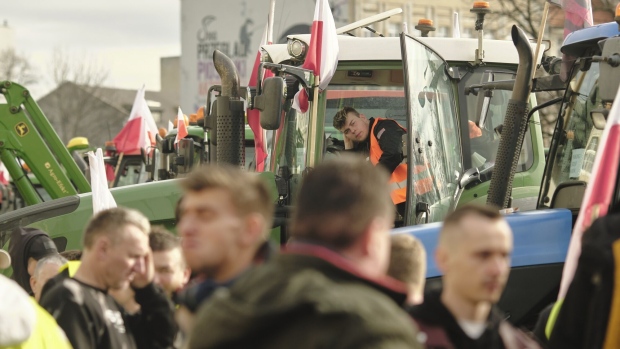Feb 22, 2024
France, Poland Ask EU to Closely Track Ukraine Grain Production
, Bloomberg News

(Bloomberg) -- France is close to persuading the European Union to monitor grain production in Ukraine more closely as the bloc pushes to extend the suspension of import duties on the country’s products for another year.
During the bloc’s ambassadors meeting on Wednesday, France pushed the EU’s executive arm to regularly publish information on imports of products from Ukraine that are sensitive for member states, according to people familiar with the issue.
Poland, which said it would prefer France’s proposal to apply to more goods, warned that unprecedented support measures to help Kyiv risks radicalizing farmers, said the people, who asked not to be named discussing confidential talks.
As countries push for better management of food imports from Ukraine, the European Commission aims to extend the suspension of duties and quotas on the country’s imports to the bloc by a year under the so-called Autonomous Trade Measures. Introduced in June 2022 following Russia’s invasion of Ukraine, the measures helped liberalize trade with Kyiv.
The influx of Ukrainian products, however, has been a sticking point for neighboring Poland where farmers have blocked border crossings and disrupted imports, prompting its government to appeal to the EU to help ease tensions.
“We need to find a joint solution in order to protect Polish interests and we won’t back down,” Polish Prime Minister Donald Tusk said in Warsaw on Thursday ahead of Commission President Ursula von der Leyen’s visit to the Polish capital on Friday. ”We’ll be trying to convince both Kyiv and Brussels to start understand Polish point of view,” he said adding that almost every EU country farmers and producers are revolting not only against regulations.
Read more: EU Farmers Push the Bloc to Limit Ukraine Trade Measures
Protests have grown in recent days with 2,500 trucks trying to enter from Poland on Wednesday stuck at the border. Farmers have disrupted passenger and rail transport from Ukraine, spilling grain on the tracks earlier this week.
While grain shipments are only allowed to transit through Poland to ports on the Baltic Sea or elsewhere in Europe, Polish farmers have demanded to close the border for other food products, including sugar and frozen fruits. They claim many of the food imports are of inferior quality or shipped illegally.
Aside from cheaper imports from countries outside the bloc, farmers across Europe have hit the roads this year also protesting EU-wide policies that require more environment-friendly farming.
The commission welcomed France’s proposal to monitor grain and confirmed there were no plans to extend suspension of duties to Ukraine beyond 2025, people familiar with the discussion said. Instead, the EU plans to negotiate with Ukraine a reciprocal trade liberalization deal for products that still have duties as the bloc considers Kyiv’s application for membership.
EU agriculture ministers will meet in Brussels on Monday to discuss ways to respond to the current crisis in the agriculture sector.
Read more: Farmers’ Revolt Threatens Election Year Upsets Around the World
French President Emmanuel Macron told reporters earlier this month that France had been able to secure a stronger framework for Ukrainian imports from the commission.
“We have obtained the setting of stricter rules to prevent the clear abuses and the destabilization we’ve seen over the past months,” he said after a recent meeting of EU leaders. “We have therefore obtained that here is a strengthened safeguard mechanism in case of market disruption, which would allow for intervention measures if cereals coming from Ukraine in the European market came to destabilize our prices too strongly or create unfair competition.”
--With assistance from Maciej Martewicz and Samy Adghirni.
©2024 Bloomberg L.P.








